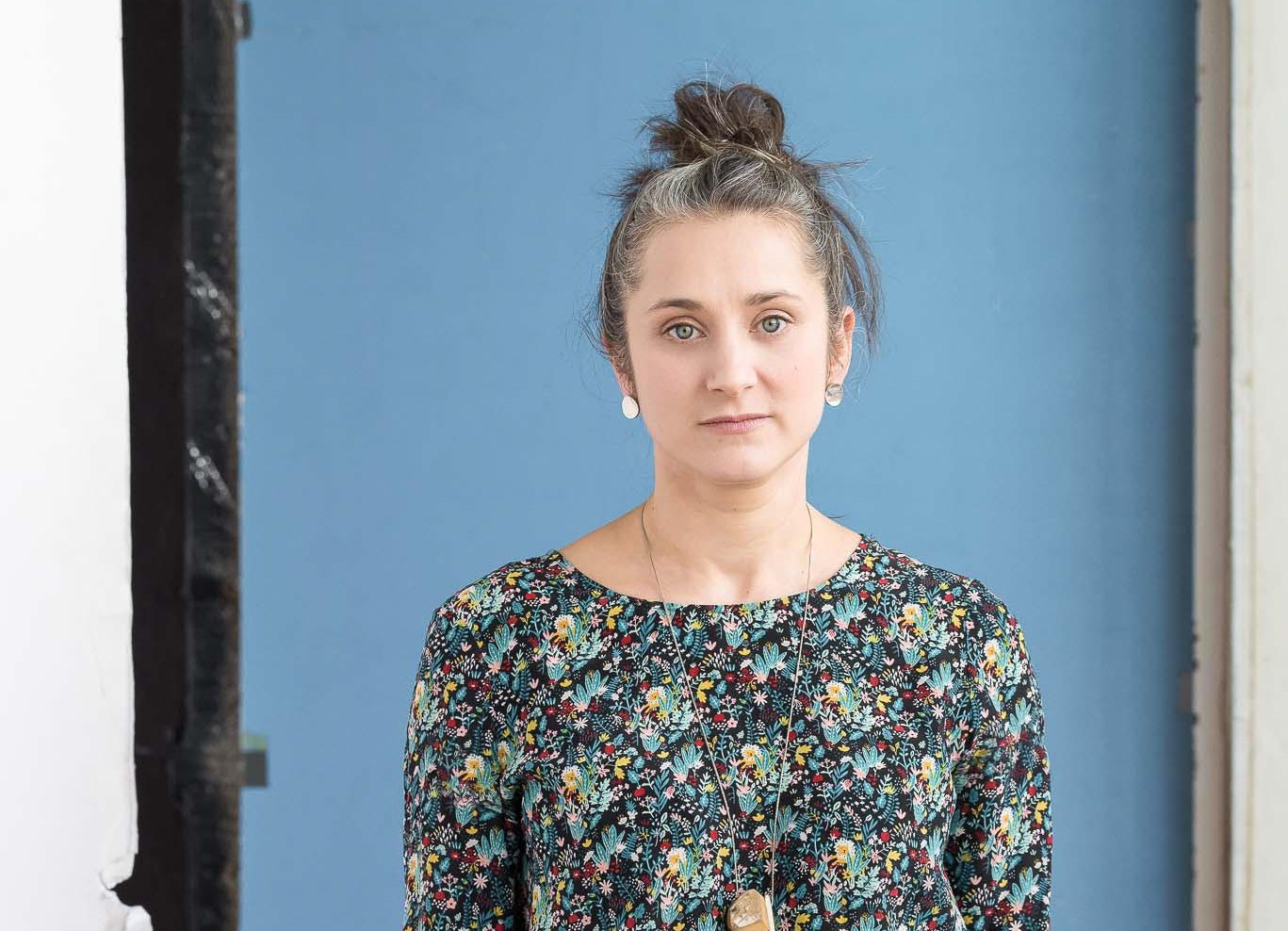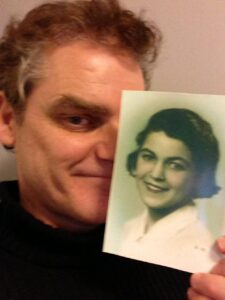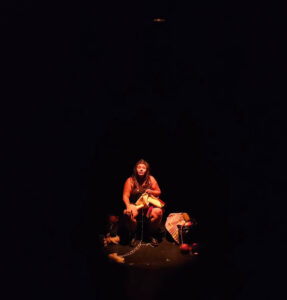
Hannah Moscovitch
We certainly live in a time when some people feel empowered and gleeful to express their ignorant and offensive opinions in a public forum, but conversely, I think we also live in a time where many of us express very carefully considered, curated reflections that are meant to denote how progressive and sensitive to the cultural zeitgeist we are. Sometimes it seems like the Internet is made up of Hillary Clinton’s “basket of deplorables” on one side, and then a pannier of the morally faultless on the other side. But what about all the learning and growing that is happening- the mistakes being made and then corrected- in the middle? Surely, that is actually the more commonplace and relatable experience?
In Hannah Moscovitch’s new play, Red Like Fruit, which opened last night, April 5th, 2024, at the Bus Stop Theatre in Halifax, Moscovitch is, in part, exploring a thought that she had back in 2014 when the first allegations against then CBC star Jian Ghomeshi were first coming to light. In that moment in 2014 she, almost reflexively, questioned the credibility of the very first allegations she heard against him. This response was even more astonishing to her upon later reflection, because she herself had had her own experience with Ghomeshi at a Dora Awards party only a year or two earlier. “He’d been talking to me for a long time,” she says, “and a couple of women at the party had come up to me at different points and had been like, ‘don’t go anywhere with him, don’t talk to him too much longer.’ Not just one [woman], a whisper network was happening, and then at some point one of my friends actually interrupted the conversation, and walked me away from him. Even though that was my experience just a year or two before, the first thought I had [upon hearing the allegations against him] was that it wasn’t believable. Then, obviously, it became very believable, as the women’s stories started to come out… But it’s interesting, it’s interesting what my brain did.” Moscovitch was raised by a feminist mother who wrote books about women in the workforce, and a father who worked as a professor in the Social Work department of a university, who trained social workers working in rape crisis centres. She grew up going to Take Back the Night marches, and seeing first-hand the social activism of her parents.
“So why did my brain do that?” she asks, “It’s a good question. Why do we not believe it? Why don’t I believe it, of all people, of all the people on this earth. If I don’t believe it, then who the fuck does believe it, if not me?”
In the play Lauren, played by Michelle Monteith, is a journalist reporting on a story of intimate partner violence between a Liberal civil servant and his girlfriend, and while she is trying to piece together the truth of this case, she is dealing with a slow mental health crisis of her own that leads to her asking Luke, played by David Patrick Flemming, to tell her story to the audience for her. “Part of this experiment that my character is having is to hear a man tell her story,” explains Monteith, “because of her journalism work working on this domestic violence case she’s had to interview different parties involved, so she has reflections after each interview what she’s gleaned from that interview, and how that is impacting her various experiences in her life, what it does to those experiences, and her memory. She’s really putting herself in a position to be honest and vulnerable: messy. She sort of feels like she’s stuck, like she’s replaying things, and can’t let them go, and she needs to understand them in order to [move forward],” Monteith says.
The play is very personal for Moscovitch, who says that she was interested in writing a play that showed exactly what it was like to be a woman, and for her personally, in 2018: the immediate post #MeToo Era. “You know how we all watched Mad Men (2007) when it came out, and we were like, ‘oh shit- that’s what it was like to be a woman in the 1960s.’ Those are sort of the prototypes of being a man and woman from that era, and I was [wondering] what would they be if you talked about right now. Could I show the world exactly what it’s like to be a woman now, but without the nostalgic difference [that exists for us watching] Mad Men?” Part of this, for Moscovitch, was also examining her own shifts in understanding what constitutes sexual assault. “When I was growing up we thought that rape was something that happened with a stranger with a knife jumping out of a bush, that’s what we were gearing towards. But that’s just such a fraction, a vast minority of cases. So then nothing prepares you for what it actually is, which is people you know, who are in a position of trust, who you have an entire relationship with, and who you love a lot of the time, and who you had a loving relationship with…”
“All of Hannah’s work I find it’s so nuanced,” says Monteith, “it’s like talking about the grey of things. It’s messy, and it’s complicated. But also [it’s] addressing some fundamental aspects of being a survivor.” Monteith speaks about the burden that survivors are left with when faced with the choice of coming forward or saying something that might end a friendship, a working relationship, and may end up having even larger consequences for someone you knew, trusted, and in some cases loved. “The burden that they’re left with, I think is, it’s the thing that cannot be shaken off,” Monteith adds. “I feel like her play really picks apart at that, and our own preconceived notions of what is the perfect victim, what happens in our minds if someone is flawed, or it seems to justify things in people’s minds, but really… there’s nothing justifiable about it.”
Between the initial workshop for Red Like Fruit in 2018, and rehearsals for the production here in Halifax Monteith went back to school and graduated from George Brown’s Assaulted Women’s and Children’s Counsellor/Advocate Program. “Everything I was taught was through a feminist, anti-oppressive, anti-racist, trauma-informed lens, and so much of that work was unpacking our own stuff that we bring to the table, so that if we’re supporting someone we’re able to identify when our own stuff is coming to [the surface]. It was an amazing experience, and I knew no matter what I do with it, it’s going to enrich my life, and any room I enter because of that knowledge. It put me in an interesting position for this [role].” In the play Lauren is forced to confront her own feelings about the truth of her own past experiences, before she is able to engage with the truth she is hearing from other women. “That’s exactly what the struggle of the play is,” says Moscovitch, “She’s looking at this woman who is an intimate partner violence survivor and she’s like, ‘but if that is true, then it undoes everything [about me]. And that’s the problem, right?”
Monteith adds, “My character asks, ‘isn’t [what happened to me] normal?’ … Maybe? But that doesn’t make it okay.”
“People often equate cancel culture and #MeToo as the same thing,” Monteith adds, “and it actually really makes me angry, because I don’t think it’s the same thing… I do think that people can make mistakes. How they’re accountable, or how they accept accountability, to me, is what makes all the difference. I associate accountability with a deep apology and recognition of the harm that was caused.”
Even before the play had its world premiere Red Like Fruit was shortlisted for The Susan Smith Blackburn Prize, which is the oldest and largest playwriting prize honouring women+ writing for the English-speaking theatre. For Moscovitch, who has received the Governor General Award for English-Language Drama in 2021, the Trillium Book Award, two Dora Mavor Moore Awards, she notes what is exciting about being shortlisted for the Susan Smith Blackburn Prize is that it is international, with more than two hundred submissions from plays written in English from all over the world. “Women are writing the big bulk of the plays right now in the world, many of the best writers that we think of in world right now are women,” Moscovitch says, citing Annie Baker, Suzan-Lori Parks, and Lynn Nottage as immediate examples. “There’s all these amazing women working, so it feels like a lot to be a finalist for [this] award… and [when] you meet the other women [who have been shortlisted], you’re like, “Oh shit. These are women at the top of their game. [Women] from Ireland, from England, from the US. We’re all here together, and that feels kind of interesting and good… It also feels good to be Canadian in that mix because, honestly, [many of] these women come from countries where they have much better resources [in the theatre] than we have in Canada- much better, by so many miles better. We’re smaller, we have less of a tradition of writing theatre than in England or America, we have less established theatres, we have less established new works, we’re really just starting off.” Coming from a country where the theatrical tradition, and playwriting especially, is still so relatively new, being shortlisted for a prize like this one is a big accomplishment. Moscovitch points out that for many British playwrights their elder is William Shakespeare. “They’re in relationship with him,” she says, “I look up deeply to Wajdi Mouawad and John Mighton, Daniel MacIvor, and Judith Thompson, but they’re fucking alive. Shakespeare is not alive, and neither is Tennessee Williams or Arthur Miller, or Lorraine Hansberry. It’s just different.”
One of the ways that Red Like Fruit stands out among all the other plays being written in English by women today is that Moscovitch is subverting many conventions and expectations of the way that stories are told onstage in a brand new way. Michelle Monteith says that director Christian Barry “feels like [the play] is a new form [of theatre]. That’s been really interesting for us to rehearse because David has [almost] all the text.” Moscovitch says that one of the reasons that she felt that this play would be a good match for Barry’s 2b Theatre in Halifax was because “the content that they’re willing to endorse is really sophisticated, and this play is unconventional.” She explains that whether she is working in theatre, the medium she feels the most comfortable with, or in television (Little Bird, Interview with the Vampire), a medium she feels like she is still figuring out, she is mostly drawn to a project’s story and its ethics. In the theatre, whether she is working with 2b here in Halifax, with the Stratford Festival, or the Tarragon Theatre in Toronto or anywhere else, she wants to make sure her play is the right match for the audience of each individual theatre that she is working with.
Michelle Monteith shares a Virginia Woolf quote with me that Christian Barry brought into the rehearsal hall and Monteith has written at the front of her script: “If you don’t tell the truth about yourself, you cannot tell it about other people.”
This play is all about finding that truth… and then also believing it.
2b Theatre’s world premiere of Hannah Moscovitch’s play Red Like Fruit plays at the Bus Stop Theatre (2203 Gottingen Street, Halifax) until April 21, 2024. Performances are Tuesday to Saturday at 7:30pm, with 4:00pm performances on Saturdays and Sundays. The show is only 75 minutes long with no intermission. There are $40.00 General Admission tickets, and $20.00 tickets for students, arts workers, and anyone for whom the $40.00 ticket price is not accessible. Conversely, you can also donate to 2b by buying a $100.00 ticket, which invests in the company’s future work. Tickets are available at this website.
Due to the nature of the story and the themes of the play, 2b recommends that Red Like Fruit is only for audiences 16 years and older. Parental guidance is required.
Latecomers won’t be able to be admitted to the performance, although re-entry is possible.
Tickets will be on sale online until 6:00pm the day of the performance. At which time the online site will close down, and any remaining tickets will be available at the door at the Bus Stop.
During the performances on Sundays April 7, 14, 21st CHILDCARE WILL BE AVAILABLE.
During the performances on Wednesdays April 10th and April 17th MASKS WILL BE REQUIRED.
Note: 2203 Gottingen Street is wheelchair accessible with private, gender-neutral washrooms. The audience seating for this production will be on raised levels with steps. If you need a floor-seat/seat near the exit for accessibility purposes please email us at access@2btheatre.com and we will reserve one for you.








1 thought on “Hannah Moscovitch & Michelle Monteith on Moscovitch’s New Play Red Like Fruit”
Comments are closed.